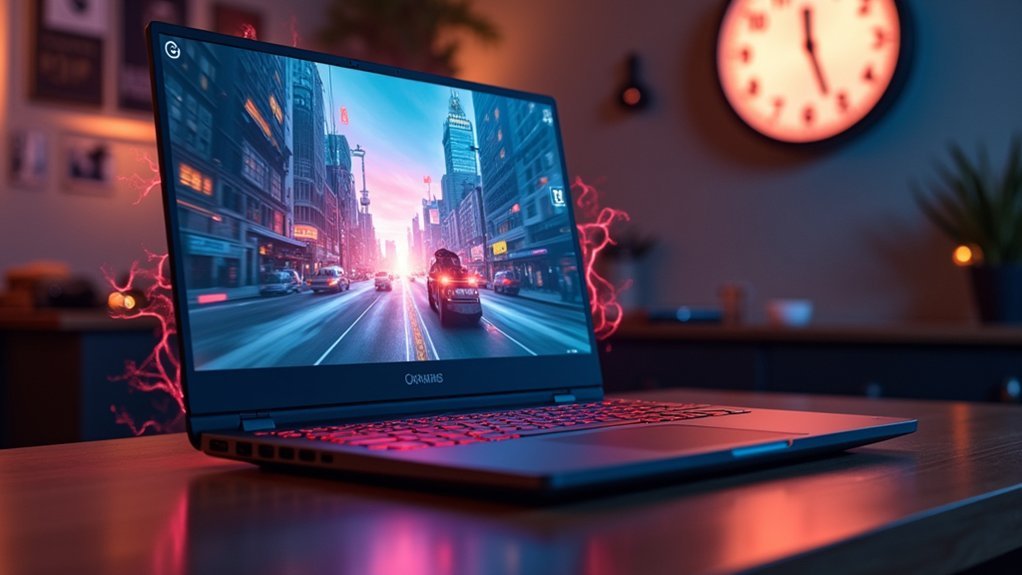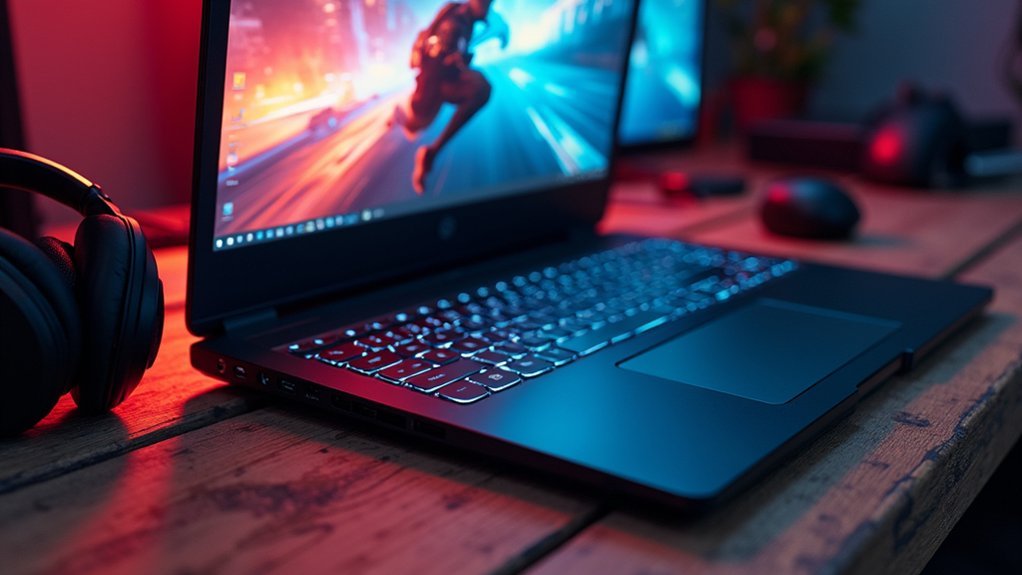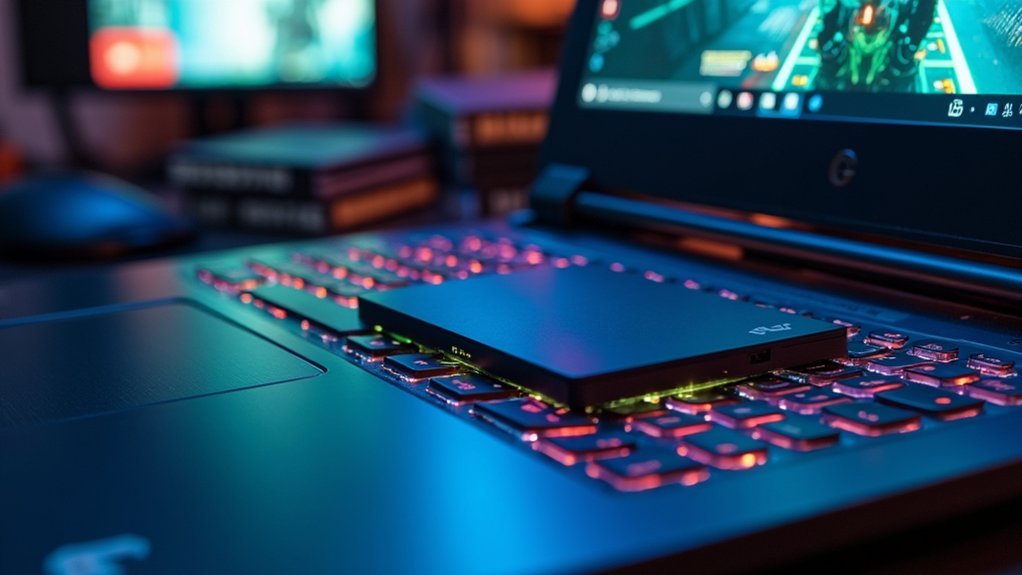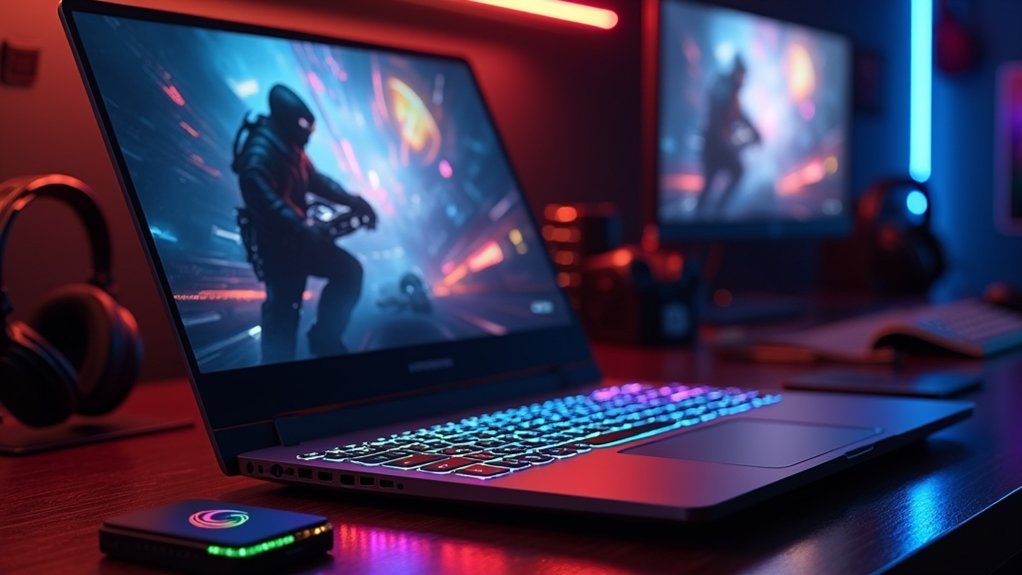SSDs transform your budget gaming laptop by slashing load times from minutes to seconds with read speeds up to 100 times faster than HDDs. You’ll eliminate stuttering in open-world games, boot your system in 10-15 seconds, and enjoy smooth multitasking without slowdowns. Your laptop becomes more responsive, handles large game files efficiently, and offers better shock resistance for portable gaming. Discover how choosing the right SSD type and capacity maximizes your gaming investment.
How SSDs Dramatically Reduce Game Loading Times on Budget Laptops

Game loading screens can test even the most patient gamer’s resolve, especially on budget laptops equipped with traditional hard drives.
When you upgrade to an SSD, you’ll experience a dramatic transformation in your gaming performance. Load times that once stretched for several minutes shrink to mere seconds, fundamentally changing how you experience games.
SSDs deliver read speeds up to 100 times faster than traditional HDDs, allowing your budget laptop to load large game assets and levels almost instantaneously.
SSDs transform budget laptops into gaming powerhouses with read speeds up to 100 times faster than traditional hard drives.
This speed advantage means you’ll spend less time waiting and more time playing. Open-world titles that previously struggled with stuttering and long loading pauses now run smoothly, letting you plunge into action without frustrating delays interrupting your gaming sessions.
Storage Capacity Requirements for Modern Gaming on Affordable Systems
You’ll face a harsh reality when shopping for affordable gaming laptops: modern AAA titles routinely exceed 200GB, making that tempting 256GB SSD practically useless after installing Windows 10’s 20GB footprint.
Smart budget planning means targeting at least 500GB for your primary drive, or you’ll spend more time uninstalling games than playing them.
The key to maximizing your storage dollar lies in understanding how to balance SSD speed with HDD capacity, ensuring you don’t sacrifice performance while managing your growing game library.
Modern Game Size Growth
Today’s AAA titles routinely demand over 200GB of storage space, creating significant challenges for budget gaming laptops that often ship with modest 256GB SSDs. Modern game size growth has accelerated dramatically as developers incorporate 4K textures and uncompressed audio files to enhance visual fidelity.
| Game Title | Storage Required | Year Released |
|---|---|---|
| Call of Duty: Modern Warfare | 231GB | 2019 |
| Red Dead Redemption 2 | 150GB | 2018 |
| Cyberpunk 2077 | 70GB | 2020 |
| Microsoft Flight Simulator | 127GB | 2020 |
| Destiny 2 | 105GB | 2017 |
When Windows 10 consumes 20GB, you’re left with minimal room for games. Adequate storage capacity becomes essential—SSDs help by offering faster load times while accommodating your growing library without constant file management.
Budget SSD Capacity Planning
While the table above demonstrates the storage demands of current titles, planning your SSD capacity requires looking beyond individual game sizes to accommodate your entire gaming ecosystem.
You’ll need at least 500GB for budget SSD capacity planning, considering Windows 10’s 20GB requirement alone consumes significant space on smaller drives. Modern AAA titles frequently exceed 200GB, meaning a 256GB SSD won’t sustain your gaming experience long-term.
Your storage devices should target 512GB to 1TB capacity for peak performance. This range eliminates constant data management while ensuring quick loading times for open-world games requiring rapid data access.
Remember that future game releases, updates, and downloadable content will continuously demand additional space, making larger capacity investments essential for maintaining smooth gameplay without storage limitations.
Managing Limited Storage Space
Although budget gaming laptops face inherent storage constraints, strategic management techniques can maximize your available space without sacrificing performance.
You’ll need to prioritize which games deserve precious SSD real estate, keeping frequently played titles on your primary drive for peak load times. Consider uninstalling completed single-player games and moving seasonal multiplayer titles to external storage when not actively playing them.
Smart folder management helps too – relocate large media files, downloads, and documents to secondary drives or cloud storage.
Windows 10’s built-in storage cleanup tools can reclaim gigabytes by removing temporary files and system cache. Since modern games often exceed 200GB, you can’t store everything simultaneously on budget SSDs.
However, strategic rotation guarantees your active gaming library remains instantly accessible while maintaining the performance advantages that make SSDs essential for affordable gaming systems.
Performance Benefits of SSDS Vs HDDS in Budget Gaming Scenarios
When you’re shopping for a budget gaming laptop, the choice between an SSD and HDD can make or break your gaming experience. The performance benefits of an SSD upgrade are undeniable, transforming how your budget laptop handles modern gaming demands.
Here’s what you’ll gain with an SSD:
- Lightning-fast load times – Experience up to 100 times faster read/write speeds compared to traditional HDDs.
- Quick boot sequences – Start gaming in 10-15 seconds instead of waiting over 30 seconds with HDDs.
- Smooth multitasking – Run multiple applications without the slowdowns that plague HDD systems.
- Lag-free gameplay – Eliminate latency issues and reduce stuttering during intense gaming sessions.
With modern games exceeding 200GB, SSDs provide the speed and capacity needed to handle large files efficiently in budget gaming scenarios.
Durability and Reliability Advantages for Portable Gaming

Beyond raw performance gains, SSDs deliver exceptional durability advantages that make them perfect for portable gaming laptops. You’ll appreciate their shock and vibration resistance when your laptop faces accidental drops or bumps during transport. With no moving parts, SSDs eliminate mechanical failure risks that plague traditional HDDs.
| Feature | SSD Advantage | Gaming Benefit |
|---|---|---|
| Shock Resistance | Withstands drops/impacts | Protects game saves |
| Vibration Tolerance | No mechanical components | Stable performance anywhere |
| Lifespan | Longer operational life | Reduced replacement costs |
| Error Correction | Advanced data protection | Prevents file corruption |
| Weight | Lightweight design | Enhanced portability |
Gaming laptops equipped with SSDs provide superior reliability for on-the-go sessions. You won’t worry about data integrity during intense gaming, as advanced error correction capabilities safeguard your critical files while extending battery life through improved energy efficiency.
Energy Efficiency and Battery Life Improvements With SSD Storage
Since gaming laptops demand substantial power for high-performance components, you’ll find that SSD storage markedly reduces your system’s overall energy consumption compared to traditional HDDs.
This energy efficiency translates directly into extended battery life, allowing you to game longer without being tethered to a power outlet.
SSDs deliver these battery life improvements through several key mechanisms:
- Lower power draw – SSDs consume noticeably less electricity during operation
- Reduced heat generation – Less thermal output means your cooling system works less aggressively
- Faster data access – Your CPU operates more efficiently with quicker storage response times
- Extended gaming sessions – Longer battery life enables truly portable gaming experiences
You’ll also benefit from reduced operational costs over time, making SSDs an eco-friendly choice that saves money while enhancing your gaming laptop’s performance.
Choosing the Right SSD Type and Capacity for Your Budget Gaming Laptop

When upgrading your budget gaming laptop’s storage, you’ll need to choose between NVMe and SATA SSDs while ensuring your motherboard supports your selected type.
NVMe drives offer considerably faster speeds up to 7,000 MB/s compared to SATA’s 600 MB/s limit, but they’re not compatible with all systems.
You’ll also face the critical decision of balancing storage capacity against your budget, as modern games can consume over 200GB each while SSD prices continue to drop.
SSD Types and Compatibility
Although budget gaming laptops often come with limited storage options, you can greatly improve performance by upgrading to the right SSD.
Understanding SSD types and compatibility is essential before making your purchase decision.
When selecting an SSD, you’ll encounter two main options that differ markedly in performance:
- M.2 NVMe SSDs – Deliver blazing speeds up to 7,000 MB/s for superior gaming performance
- 2.5-inch SATA SSDs – Limited to approximately 600 MB/s but more universally compatible
- Storage capacity – Minimum 500GB recommended to accommodate modern AAA titles exceeding 200GB
- Motherboard compatibility – Verify your laptop supports NVMe interface and correct form factor
You must check your laptop’s specifications carefully, as not all budget models support M.2 NVMe SSDs.
Additionally, confirm the manufacturer’s maximum supported storage capacity to avoid compatibility issues.
Capacity Vs Budget Balance
Finding the sweet spot between storage capacity and your budget requires strategic thinking, especially when modern games demand increasingly more space. When you choose an SSD for capacity vs budget balance, remember that AAA titles now exceed 200GB, making 500GB your minimum target.
SSD gaming performance improves greatly with NVMe drives, so prioritize speed over sheer capacity if forced to choose.
Consider cost-per-gigabyte ratios carefully—prices have dropped considerably, letting you stretch your budget further.
A smart hybrid approach pairs a smaller NVMe SSD for your OS and favorite games with a larger HDD for additional storage. This strategy maximizes your investment while ensuring peak performance where it matters most for gaming.
Frequently Asked Questions
Does SSD Improve Laptop Performance?
Yes, you’ll experience dramatically improved laptop performance with an SSD. You’ll get faster boot times, quicker application loading, smoother multitasking, better gaming performance, and longer battery life compared to traditional hard drives.
Does SSD Improve Gaming Performance?
Yes, you’ll see dramatic gaming improvements with an SSD. You’ll experience faster load times, smoother gameplay, reduced stuttering, and better multitasking while gaming, especially in open-world titles.
Does Upgrading SSD Storage Increase Performance?
Yes, upgrading your SSD storage dramatically increases performance. You’ll experience up to 90% faster loading times, improved system responsiveness, and smoother gameplay in demanding titles requiring quick asset access.
Can SSD Reduce Lag in Games?
Yes, you’ll experience markedly reduced lag with an SSD. You’ll get faster asset loading, quicker level changes, and smoother gameplay since SSDs access data up to 100 times faster than traditional HDDs.




Leave a Reply